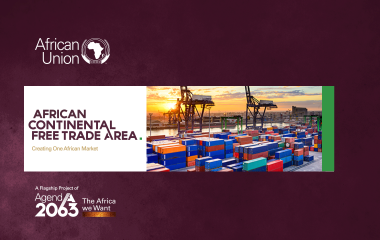 African Union (AU)
African Union (AU) Editor’s Note: Earlier, Oscar Katusya pointed us to a strategy that may benefit the African continent as it deals with the COVID-19 pandemic. Today, Oscar tells us trade and politics are some of the key aspects of this strategy.
The Agenda 2063
To understand the Africa Continental Free Trade Area, we first have to be aware of Agenda 2063. African leaders, under the auspices of the African Union, started the Agenda 2063 which aims at prioritizing 7 aspirations such as peace and security, and growth and sustainable development.
The Vision has a 50-year timeline from 2013 to 2063. The agenda further encompasses key flagship programmes that will aid in achieving the ambition such as a free trade area.
With a youthful population, Africa is vibrant and open to innovation and new opportunities. The Agenda 2063, should it succeed, will result in a more unified Africa. A fifty-year timeline is enough for the implementation of the Vision through ideas like a free trade area.
The African Continental Free Trade Area
The African Continental Free Trade Area (AfCFTA) is one of the flagship programs under Agenda 2063. It is an agreement for the creation of the largest free trade area in the world.
The AfCFTA is mandated with the creation of a single continental African market of an estimated 1.3 billion people. The trade area reports an approximated combined gross domestic product of $3.4 trillion.
As of June 2022 54, African Union countries had signed the AfCFTA agreement, with 43 having deposited their instrument of ratification.
AfCFTA Pilot Kick Off
Recently seven countries were selected for the African Continental Free Trade Area pilot phase. The countries are Cameroon, Ghana, Egypt, Kenya, Tanzania, Rwanda, and Mauritius.
Under the pilot plan, Kenya shipped its first exports of tea and batteries to Ghana. Rwanda also was involved in trade with Ghana. It exported coffee products as part of the AfCFTA agreement.
In the coming months, we could see the exchange of goods among all the seven countries. So far, the seven countries have shown a willingness to be involved in the pilot phase which is a good sign of the idea’s reception by African countries.
AfCFTA will boost trade among African countries by up to 25 percent by 2040.
In 2023, which will mark 10 years since the inception of Agenda 2063, we’ve seen progress as many countries have signed the AfCFTA agreement.
The progress shows that African leaders are committed to the agenda which, when achieved, will benefit the continent.
